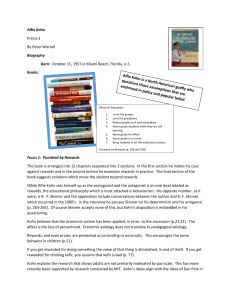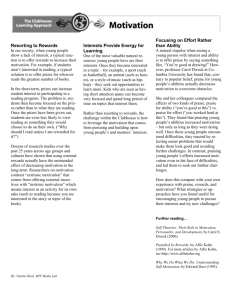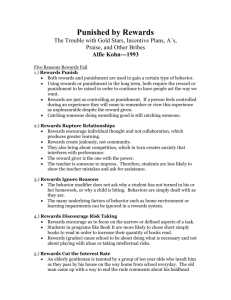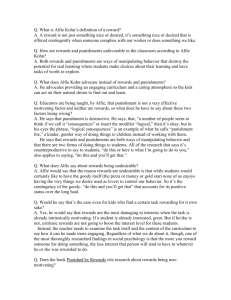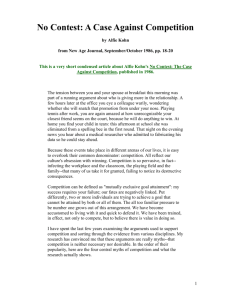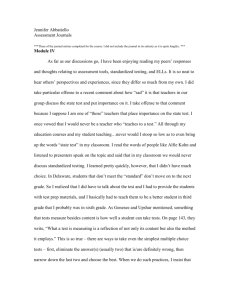English - Bethlehem University
advertisement
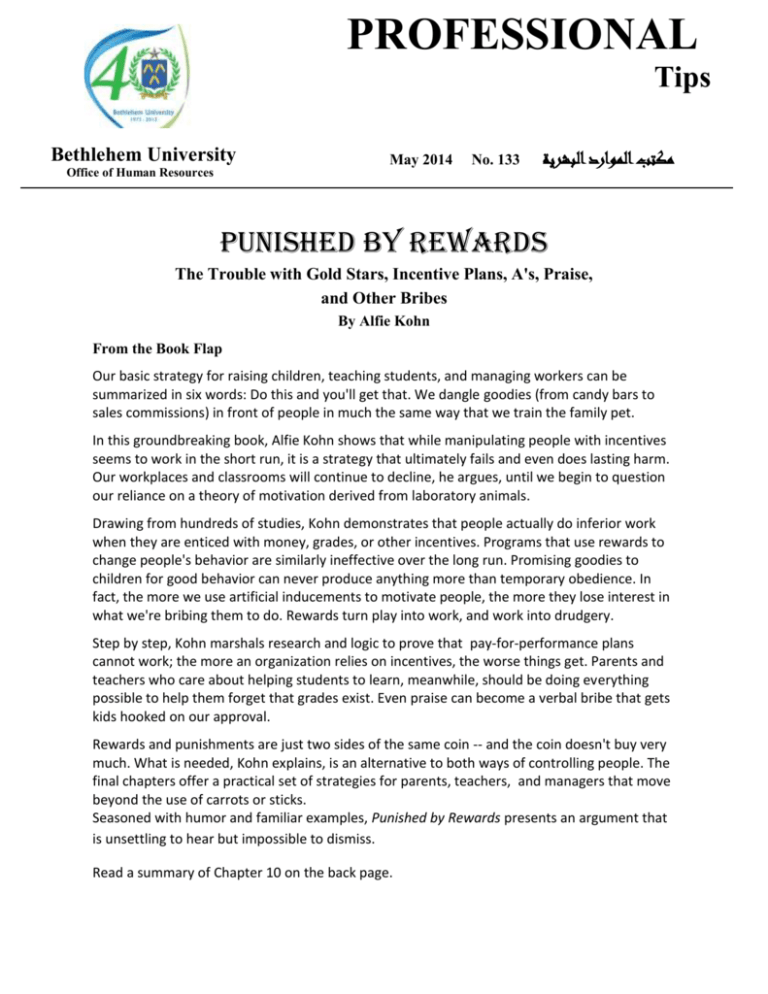
PROFESSIONAL Tips Bethlehem University May 2014 Office of Human Resources No. 133 مكتب الموارد البشرية Punished by Rewards The Trouble with Gold Stars, Incentive Plans, A's, Praise, and Other Bribes By Alfie Kohn From the Book Flap Our basic strategy for raising children, teaching students, and managing workers can be summarized in six words: Do this and you'll get that. We dangle goodies (from candy bars to sales commissions) in front of people in much the same way that we train the family pet. In this groundbreaking book, Alfie Kohn shows that while manipulating people with incentives seems to work in the short run, it is a strategy that ultimately fails and even does lasting harm. Our workplaces and classrooms will continue to decline, he argues, until we begin to question our reliance on a theory of motivation derived from laboratory animals. Drawing from hundreds of studies, Kohn demonstrates that people actually do inferior work when they are enticed with money, grades, or other incentives. Programs that use rewards to change people's behavior are similarly ineffective over the long run. Promising goodies to children for good behavior can never produce anything more than temporary obedience. In fact, the more we use artificial inducements to motivate people, the more they lose interest in what we're bribing them to do. Rewards turn play into work, and work into drudgery. Step by step, Kohn marshals research and logic to prove that pay-for-performance plans cannot work; the more an organization relies on incentives, the worse things get. Parents and teachers who care about helping students to learn, meanwhile, should be doing everything possible to help them forget that grades exist. Even praise can become a verbal bribe that gets kids hooked on our approval. Rewards and punishments are just two sides of the same coin -- and the coin doesn't buy very much. What is needed, Kohn explains, is an alternative to both ways of controlling people. The final chapters offer a practical set of strategies for parents, teachers, and managers that move beyond the use of carrots or sticks. Seasoned with humor and familiar examples, Punished by Rewards presents an argument that is unsettling to hear but impossible to dismiss. Read a summary of Chapter 10 on the back page. Chapter 10 Thank God It’s Monday: The Roots of Motivation in the Workplace In chapter 10, Alfie offers “a summary of what research and experience suggest are useful ways of providing an environment conducive to motivation in the workplace”. The author draws the following three steps: Step One: Abolish Incentives Alfie presents an alternative to the pay-for-performance and “proposes to those responsible for setting policy: Pay people generously and equitably. Do your best to make sure they are not exploited. Then do everything in your power to help them put money out of their minds. The problem with financial incentives is not that people are offered too much money, rather is that money is made too salient. Moreover, it is offered according to the principle of “Do this and you’ll get that.” To end this practice is to take the first step toward what is wrong with organizations. Step Two: Re-evaluate the Evaluation After abolishing merit pay, Alfie suggests “to take a hard look at its first cousin, the performance appraisal. If the overriding concern really is to foster improvement, then the contours of a program for evaluation should begin to take shape: It is a two-way conversation, an opportunity to trade ideas and ask questions, not a series of judgments about one person pronounced by another. It is a continuous process rather than a quarterly or annual event. It never involves any sort of relative ranking or competition. Most important, it is utterly divorced from decisions about compensation.” Step Three: Create the Conditions for Authentic Motivation Alfie cites the summary of findings of a research anthology entitled Paying for Productivity by Alan S. Blinder as follows: “Changing the way workers are treated may boost productivity more than changing the way they are paid.” Alfie believes this makes sense because treating workers decently allows them to become motivated, and motivation in turn boosts productivity.” Mangers need to do these things: Watch: Look for problems that need to be solved and help people to solve them. Listen: Listen seriously and respectfully trying to see things from their point of view. Talk: Provide plenty of feedback on what’s going well, what needs improvement, and how to change. Think: Understand the deeper issues, rather than simply reaching for the seductive simplicity of incentive-based system. Alfie summarizes step three by stating, “Most of all, a manager committed to making sure that people are able and willing to do their best needs to attend to three fundamental factors. These can be abbreviated as the three “Cs” of motivation-to wit, the collaboration that defines the context of work, the content of the tasks, and the extent to which people have some choice about what they do and how they do it.”
